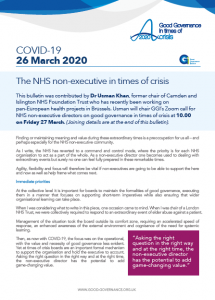The NHS non-executive in times of crisis
26 March 2020

This bulletin was contributed by Dr Usman Khan, former chair of Camden and Islington NHS Foundation Trust who has recently been working on pan-European health projects in Brussels. Usman will chair GGI’s Zoom call for NHS non-executive directors on good governance in times of crisis at 10.00 on Friday 27 March. (Joining details are at the end of this bulletin).
Finding or maintaining meaning and value during these extraordinary times is a preoccupation for us all – and perhaps especially for the NHS non-executive community.
As I write, the NHS has reverted to a command and control mode, where the priority is for each NHS organisation to act as a part of the whole. As a non-executive director one becomes used to dealing with extraordinary events but surely no one can feel fully prepared in these remarkable times.
Agility, flexibility and focus will therefore be vital if non-executives are going to be able to support the here and now as well as help frame what comes next.
Immediate priorities
At the collective level it is important for boards to maintain the formalities of good governance, executing them in a manner that focuses on supporting short-term imperatives while also ensuring that wider organisational learning can take place.
When I was considering what to write in this piece, one occasion came to mind. When I was chair of a London NHS Trust, we were collectively required to respond to an extraordinary event of elder abuse against a patient.
Management of the situation took the board outside its comfort zone, requiring an accelerated speed of response, an enhanced awareness of the external environment and cognisance of the need for systemic learning.
Then, as now with COVID-19, the focus was on the operational, with the value and necessity of good governance less evident. Yet at times of crisis boards are an important formal mechanism to support the organisation and hold the executive to account. Asking the right question in the right way and at the right time, the non-executive director has the potential to add game-changing value.
I also noticed that when the executive team was rightly focused on internal matters, the non-executive could act as a conduit for effective external communication. The application of soft skills at such times of acute stress also added significant value.
Shock manifests in multifaceted ways and I witnessed how non-executives helped to manage this through mentorship, coaching or just a good old-fashioned ability to listen.
Framing afterwards
Experience has also taught me that non-executives hold that precious ability to take a step back – and this can provide a means to frame both the present and the future. One of the roles that the non-executive can usefully play is to begin to reflect on governance resilience.
In the late 1990s, our board periodically considered the issue of organisational and health system risk management. The risk of a pandemic ranked highly even then but I now ask myself whether the board was enabled to engage with the issue in a sufficiently robust manner?
Valuing virtual communication
A final reflection is that the non-executive today faces these challenges with the additional hurdle of having to work within a virtual space.
Virtual communication is evolving in real time, with volume, form and value increasing as it becomes the principal means of exchange, rather than a sub-optimal adjunct. Non-executives can play their part in ensuring that board observes good governance by taking time out to reflect on how they can improve their engagement.
At a basic level this means ensuring that you are able to connect in a manner that does not mean the technology acts as a barrier. Beyond this the non-executive can reflect on how to engage most effectively online. But again – with one eye on the afterwards, as ever – is this not a good time to think more broadly about board governance and communication?
Closing thoughts
There has been significant global variation in health system response to COVID-19, with preparedness and response generally stronger in eastern countries than those in the west.
The crisis leaves systems such as the NHS facing unprecedented levels of need and risk. The NHS will undergo change as a result of its experience of dealing with this, the most significant challenge it has faced since inception in 1948.
The role of the NHS board and its non-executive director resource will be instrumental in helping to both inform and react to what is likely to be a challenging future.
They are also likely to require support in helping to develop more resilient and robust systems of governance and the work of organisations such as the Good Governance Institute is likely to be vital in supporting such efforts.
Join the discussion on good governance in times of crisis
Contact us by emailing advice@good-governance.org.uk to join the first of our good governance in times of crisis Zoom calls for non-executive directors, which will take place at 10.00 on Friday, 27 March 2020.

